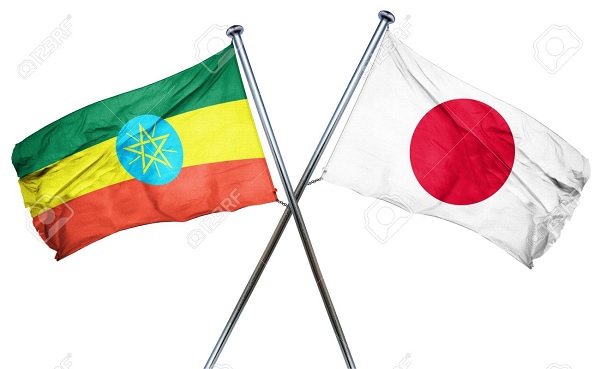
Back in 1964, the world’s most exciting sporting event, known as the Olympics, was preparing to take place beneath the sky’s’ of Tokyo, Japan. The then-world-remarkable black Ethiopian athlete Shambel Abebe Bikila was headed to Tokyo for the Olympic Games. He is the first Ethiopian Olympic gold medallist, winning his and Africa’s first gold medal at the 1960 Summer Olympics in Rome while running barefoot.
He defended his medal in Tokyo, becoming the first athlete to successfully win back-to-back in an Olympic marathon. In both victories, he ran in world-record time. After his victory, Tokyo remained imprinted in the hearts of Ethiopians.
Abebe went to Tokyo as a sporting hero, but there have been many visits between Ethiopia and Japan prior to his grand triumph. But the long-distance runner remains an emblematic figure in the longstanding ties between Addis Ababa and Tokyo. The meeting between Abebe’s son and the late Japanese Prime Minister Shinzo Abe in 2014 spoke volumes in this regard. In fact, the bilateral cooperation between Africa’s capital and Asian nation harkens back to the 1930.
In 1955, the countries re-established diplomatic ties, and three years later, they exchanged ambassadors. From that time on, the two countries’ ties expanded into multilateral agreements. Beyond that, the two nations have deepened their relations in recent years in different cooperation sectors.
Tokyo has been a key partner in Ethiopia’s development, providing assistance in various sectors such as education, healthcare, and agriculture. The two countries have also collaborated on projects aimed at promoting sustainable development and addressing climate change challenges.
Especially Japan’s support for Ethiopia during COVID-19 and the post-northern Ethiopian conflict rehabilitation work as an example of how the two nations’ relations have excelled. The country that once witnessed first-hand the devastating impact of war has been committing financial assistance to help Ethiopia’s reel from the conflict. At the heart of it is the JICA (Japan International Cooperation Agency).
Japan grants worth millions of dollars for Ethiopia’s different part rehabilitation works and women- and children-focused projects. By rebuilding schools that were fully demolished during the northern Ethiopian conflict, the country is playing a pivotal role. The Japanese government works with other partners to carry out important projects that go beyond building schools and assisting in getting kids back into the banquet of education.
The global agency has also been the frontrunner in promoting education and human resources in Ethiopia, another vital component of the two countries’ partnership.
The agency is supporting the construction of schools and has been involved in improving the quality of math and science education as well as school management, benefiting over 500,000 children since 2007. Similarly, over 600,000 people have been benefiting from the agency’s support from the construction of water and sanitation facilities in urban canters and in small towns in six regions across the country since 2005, said Chief Representative of the JICA Ethiopia Office, Dr. Morihara Katsuki, in a previous interview with The Ethiopian Herald.
The relation between Ethiopia and Japan has been growing over the years, with both nations elevating ties in different sectors, a fact accentuated by the latter’s outgoing ambassador.
In her recent stay with The Ethiopian Herald, Amb. Ito Takako reaffirmed that Japan has been sending experts trained in many professions to Ethiopia through the Japanese International Cooperation Agency (JICA). According to ITO, under the framework of the Tokyo International Conference on African Development (TICAD), a human resource training centre has been completed in Addis Ababa, which is going to be the headquarters of a Kai Zen movement that provides the venue, not only for Ethiopians but for the people from Africa to learn about the Kai Zen philosophy.
“Ethiopians should use their resilience in the face of numerous obstacles, such as conflicts, droughts, floods, inflation, and desert locust infestations, to work toward achieving peace and prosperity.”
Japan’s production philosophy (Kaizen) has been applied in the private and agricultural sectors in Ethiopia since 2009. In Kaizen-applied African countries, Ethiopia’s experience is successful. Now over 1500 industries based in the country are using the Kizen philosophy, and based on this, over 4.5 billion birr have been saved from dissipation, Ethiopia’s Minister of Industry, Melaku Alebel, told journalists back in August 2023 while indicating that the TICAD training centre’s capacity to accommodate 50,000 trainees annually.
The Minister stated that, the TICAD training centre contributes a great deal to increasing production and productivity. Melaku said that, the Kaizen philosophy is a philosophy that works on the culture of work and capability of manpower while vowing a continued investment in youth training and factory workers. He pointed out that, Kaizen training should be integrated into the manufacturing sector as well as the service sector.
Moreover, according to the Japan Foreign Minister’s report, the two nations’ trade exchange has shown an uptick, with over 34.6 million USD of good has been exported to Japan and over 78.3 million USD imported from Ethiopia in 2018.
The Observatory of Economic Complexity (OEC) report also indicated that during 2021, Ethiopia had a large net trade with Japan in the exports of vegetable products ($98.9 million), animal hides ($388 million), and animal and vegetable bi-products ($359 million). During 2021, Japan had a large net trade with Ethiopia in the exports of Transportation ($76M), Machines ($41.4M), and Metals ($17.2M).
Ethiopia has imported more of Japan’s technological products and vehicles, and in return, the country’s green gold coffee is more exported, covering the Japanese coffee market’s consumption.
The two countries relations are also boosted by high-level visits by officials. Also, the leaders of both nations have expressed their commitment to further enhancing bilateral cooperation, exploring new areas of collaboration, and deepening the bonds between the two nations.
In August, the then Japan’s foreign minister, Hayashi Yoshimasa, paid a visit to Ethiopia, and in his discussions with Deputy Prime Minister and Foreign Minister of Ethiopia Demeke Mekonnen, he expressed his country’s steadfast desire to strengthen the long-standing diplomatic ties and developmental cooperation with Ethiopia in the trade and investment spheres.
The strengthening of bilateral relations between Ethiopia and Japan is seen as a positive development that will benefit both countries. It is expected that this renewed commitment to cooperation will lead to increased investment opportunities for Japanese businesses in Ethiopia, as well as greater access to Japanese technology and expertise for Ethiopian industries.
To sum up, Abebe Bikila might have been an unforgettable icon very much known to Japanese people for his victory and determination. But, what is equally true is, Japan also remains very popular in Ethiopia owing to a song by the renowned and late Ethiopian artist Tilahun Gessese in which he described the beauty of Japanese women. It is widely believed that Tilhaun released the hit after visiting Japan.
BY EYUEL KIFLU
THE ETHIOPIAN HERALD TUESDAY 28 NOVEMBER 2023




